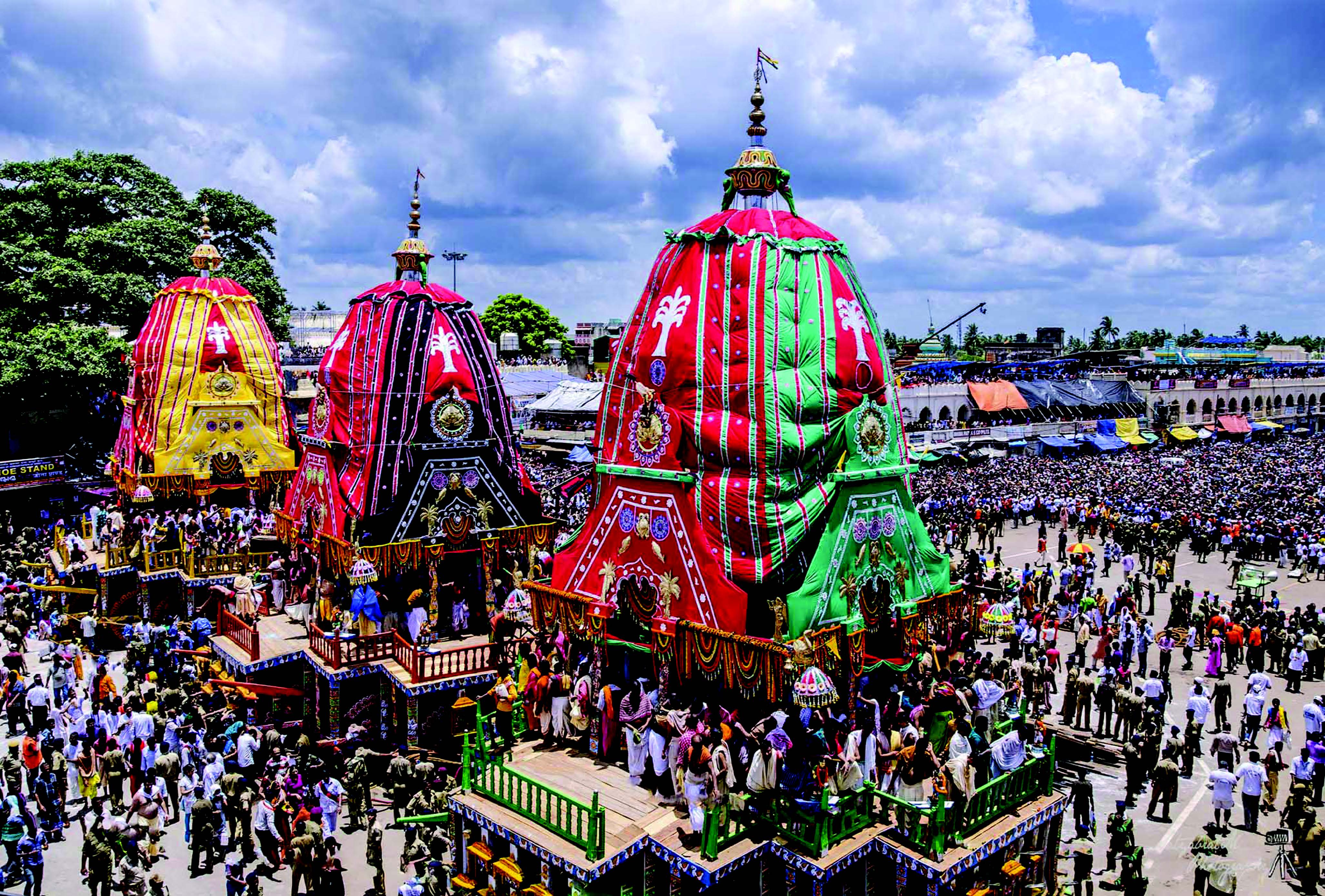
Disciplines such as religious fasting etc. that entail merits are generally called Vrat. To accept some rules of discipline is in itself a Vrat. For any advancement in life we have to accept some restrictive disciplines. A river is bound by the banks, tree is bound to earth, the strings of Sitar (musical instrument) are also bound and thereby music is produced. The essence of Himadri-Vrat chapter describes Vrat as a special undertaking, keeping some goal in mind, and making a resolution about it. In the spiritual field, to apply control over the pleasures of our sense organs, a solemn vow to observe regulatory discipline- that is Vrat.
The one who undertakes to observe Vrat is called Vratdhaari. He lives within the bounds of his vows, ever anxious to upkeep noble ideals. By being rock steady in the observance of Vrat and vows adds power to internal consciousness and that is why the followers of Vaidic culture, upon their children attaining understanding age, make them undergo the Yajnopavit (sacred thread) ceremony that urges them to a life within restrictive bounds. Those people whose life is devoid of any goal, Vrat, noble ideal or duty, are not able to achieve or do anything of importance. Vrat is a resolution with a special purpose in mind. Great power is enfolded within such resolution. Great accomplishments like the creation of the universe, are achieved through such powers.
The Upanishads describe this as “Ekoham Bahushyami…” God (Ishwar) bethought Himself ‘I will manifest and assume diverse names and forms’. He then underwent austerity. Meaning that resolution was made to encompass (Aitereya Upanishad). Ishwar then prepared the five Tanmatras (subtle elements), and with the aid of resolution activated them (Aitereya Upanishad ½). In the beginning all this was Atman (God) – one only. Besides Him there was no other for company. This Super soul then bethought Himself ‘This is My firm decision to create human beings’ (Aitereya Upanishad). The Rishis hint at the cryptic message that the great work like the creation of the universe was also accomplished only through (the aid of) resolution.
Resolution is a means to awaken our dormant powers. Just as a person will employ all his powers to (successfully) attain any difficult objective, in the same way, to accomplish the objective of his resolution, he gathers all his powers and uses them. In the manner of the feebleness of the scattered rays of the sun that have no effect on paper or cloth but can burn if they are concentrated (as through a magnifying glass), if a man gathers his unsteady mind and directs it to accomplishing a single task, his purpose will become fruitful.
To make a resolution means to concentrate one’s powers. In each field of activity in our lives, resoluteness of purpose is necessary to tread on the path of progress. Mahatma Gandhi said, “Life without solemness of purpose is like a house without foundation”. The strength of such solemnness of purpose is what makes this world endure. Not to have such solemness of purpose means to live with wavering indecision. Lack of courage to adopt a resolution is a sign of weakness. Such people are unable to successfully tackle any job. The greatest weakness (shortcoming) of man is his lack of resoluteness of purpose.
To remove this weakness, Vrats have been assigned a pride of place in Hindu religion. Through practice firm decisions become a matter of routine. The practical aspect of Vrat is closely linked to regulation of diet. When the observance of proper dietary principles becomes a habit, then, no matter what his field of activity is, such person’s resoluteness of purpose will always make him a leader. Thus for material and spiritual developments in life, it is absolutely necessary to cultivate the habit of Vrat. Vrat does not mean instant liberation from sins (faults) but rather a resolution to the effect that from today, with complete purposefulness, we will try to progress towards our chosen goal, and will mend any mistakes.
We shall fight the tendencies of laziness and procrastination that reside in the mind. The meaning of Vrat is, with firmness of purpose, make a resolution to progress in the direction of perfection. To err is human, but to be perfect is possible when we reach the heights of Sadhanaa (spiritual disciplines). Vrat is undertaken to reach such a stage. Vrat is a kind of austerity. ‘Tapo dvandva sahanam’. Tap (austerity) means, for achieving any auspicious goal, in our (daily) life, be prepared to face with equanimity happiness and sorrow.
This is the key to success in any field of activity. Tap (austerity) is the father of powers and accomplishments. Where there is Tap (austerity), there are to be found power, liberation, heaven, happiness, peace, bliss, wealth, knowledge, fame, and all. Any person who wants to lead a noble life must adopt Tap (austerity or Vrat) as his companion. All great people who have achieved success in the world have Tap (Vrat) hidden in their background. Those who do not undertake austerities (Tap or Vrat) face failures in their lives and blame destiny (for their failures). Despairing, they are not aware that they have dug up the very foundations of destiny and success.
Merely to observe the regulations regarding fasting is not a Vrat but proper conduct, love, disciplines, honesty, good manners, non-stealing, truth, non-killing (non-violence), unselfishness, etc., and with firmness of purpose to take a vow to practice these virtues, is also called a Vrat. The greatest Vrat is with resoluteness of purpose, to eliminate from our lives demoniac tendencies and to develop (acquire) godly qualities (daivy sampat or divine wealth). Vrat bestows all kinds of advantage at the physical and spiritual levels.
During the observance of vrat, one either completely abstains from food, or partly abstains from food and this gives physiological rest to the digestive apparatus, which in turn awakens and increases the digestive power, leading to ease (comfort) of digestion and purification of the mind. The basis of all these is dependant on healthy digestive apparatus and purity of mind. The physical body of a person who regularly observes Vrat remains free of disease. Vrat helps to prepare the proper mental groundwork for contemplation and meditation. Persons who over indulge in food exhibit grosser thoughts and intellect.
To sharpen the intellect, our scriptures prescribe the sacred precept of Vrat. The thoughts that are produced on the day of Vrat embed their powerful influence on the mind. The preceptors of our religion have woven stories and morals around Vrat that inspire us and help us make our lives full of strength (full of confidence and virtues). The fasting aspect of Vrat makes the mind strong and increases its firmness and the stories connected with Vrat, if their purport is understood, can transform the life of a person.
Today, unfortunately, people listen to the stories for their entertainment values and do not attempt to understand the significance that lies buried within the stories and also do not apply their teachings in their lives. In the Mahabharata, Santi parva (162-10) the following is written about Satya: “That which is immutable, imperishable, eternal, everlasting, and is not subject to change, in other words, is ever the same”.
There are two paths laid out in front of our lives. Prakriti (nature or matter) and Satyanarayana. There is ignorance on one side and bright sunshine of knowledge on the other side. There is darkness on one side and a heap of light shining brightly on the other side.
The Upanishad provides guidance in life: “Asato Ma Sadgamaya, Tamaso Ma Jyotirgamaya, Mrityorma Amritam Gamaya”. Satyanarayana Vrat points to the same direction. To progress on the path of truth is the main purpose of Satya Narayana Vrat.





Be the first to comment